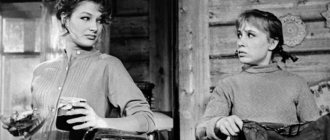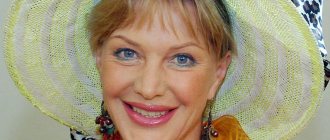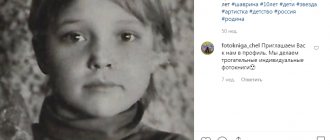“Lenin is always with you!”
He was always with us. The April matinees in kindergarten dedicated to his birthday are just the beginning. The whole life of a Soviet person was connected with Lenin - even if you want to, you still won’t forget. If only because his portrait was present on all Soviet banknotes. And everywhere in general. Countless streets of Lenin, monuments, postage stamps, postcards, even tattoos... In a word, Lenin has turned into a symbol.
Vladimir Ulyanov in the year of graduation from gymnasium No. 3. 1887 Photographer Boris Bik. Simbirsk Photo: RIA Novosti/Boris Bik
But what is a symbol? According to any encyclopedia - “a conventional sign for designating an object.” And the figure of one of the brightest and most amazing people of his time became exactly that - conventional, extremely simplified.
First of all, this concerned his biography. Everyone firmly remembered: “When Lenin was little with a curly head, he also ran in felt boots along the icy hill.” And then suddenly - once! - he is already wearing a cap, on an armored car, with his hand thrown forward: “There is such a party!” This leap was clearly recorded by official symbols - on the October stars, Lenin is precisely “with a curly head.” And on pioneer badges and everywhere else there is the canonical profile of a mature husband with a “Socratic” forehead and beard.
The middle was remembered in fragments. The elder brother Alexander was hanged for preparing an assassination attempt on Emperor Alexander III. "We'll take a different route." Expulsion from Kazan University. Link to Shushenskoye. Emigration. Everything seems to be fine, but it is completely unclear how Volodya Ulyanov turned into Lenin - a gigantic figure who turned upside down, if not the whole world, then certainly Russia.
Duel with the monarch. Why did Alexander Ulyanov want to kill the emperor? More details
Formation of revolutionary views
Vladimir Ilyich’s childhood and youth included years of brutal reaction that reigned in Russia. Any manifestation of free thought was nipped in the bud and persecuted. Later, Lenin called this period "an unbridled, incredibly senseless and brutal reaction." Since in those days all freethinkers were expelled from educational institutions, the gymnasium did not become a place for the development of his social ideals.
Lenin's worldview in childhood was influenced primarily by family upbringing and the personal example of his parents. In addition, his elder brother Alexander was an indisputable authority for Vladimir Ilyich from early childhood. Volodya tried to be like him in everything, and in any difficult situation he thought: “What would Sasha do?” Over time, his brother's authority only grew. It was from Alexander that Vladimir learned about Marxism.
Sasha Ulyanov was a very gifted young man. From childhood, he conquered everyone with his high moral qualities and strong will. Just like his father, Alexander was serious, thoughtful, strict with himself and fair. In relation to his younger brothers and sisters, he was affectionate and sensitive, so it is not surprising that all the children in the family loved him.
Dropout student?
They masterfully played on this after the collapse of the USSR, proposing a solution that was captivating in its simplicity. They say that this half-educated student and failed lawyer simply turned out to be in the right place at the right time, moreover, supported by German gold and, in general, the world behind the scenes.
The trick, however, is that even the formula “expulsion from the university” does not entirely correspond to reality. Here is the petition submitted by the first-year student Ulyanov on December 5, 1887 - the day after a stormy student meeting in which he took an active part: “Not recognizing it as possible to continue my education at the University under the current conditions of university life, I have the honor to humbly ask Your Excellency to make the appropriate order about removing me from among the students of the Imperial Kazan University." Yes, the request was late - the expulsion took place without delay, on the 4th. But it is unlikely that Ulyanov himself, who was under arrest all this time, knew about this.
Those who like to flaunt the label “dropout student” forget that even from a formal point of view it will not be possible to call Ulyanov such. In 1891, he took state exams as an external student, and out of the entire stream of 33 people, he was the only one who received the highest grade in all 18 subjects. The result is a 1st degree diploma. And a further career as a lawyer, which cannot be called a failure.
Article on the topic
What is Lenin? The leader of the revolution could become a “star” of the legal profession
LOVE TRIANGLE
...And Lenin wrote and wrote tender letters to his beloved Inessa:
“Today is a magnificent sunny day with snow. My wife and I were walking along the road along which – remember – the three of us once walked so wonderfully. I remembered everything and regretted that you were not there. Your Lenin."
Many of these letters have survived. Sometimes they talked about quarrels between lovers. Inessa, for example, wrote:
“We broke up, we broke up, dear, you and I! And it hurts so much. I know, I feel, you will never come here! Looking at well-known places, I was clearly aware, as never before, of what a large place you occupied in my life, that almost all activities here in Paris were connected with a thousand threads with the thought of you. I wasn’t in love with you at all then, but even then I loved you very much. Even now I would do without kisses, and just to see you, sometimes talking to you would be a joy - and it could not hurt anyone. Why was it necessary to deprive me of this?..”
In those years of the outbreak of the First World War, the lovers had to separate because the relationship, for reasons unknown to history, became tense. Krupskaya suddenly rebelled and rolled out a classic phrase to her husband: either she or I. What Lenin answered is unclear, but in the end Inessa left for a while.
However, this disagreement in the love “triangle” was rather a rare exception. Witnesses of the family “for three” note Krupskaya’s amazing tolerance for a woman. She even said that “the house becomes brighter when Inessa comes.”
“To Krupskaya’s credit,” wrote historian Dmitry Volkogonov, “she did not create petty-bourgeois scenes of jealousy and was able to establish outwardly even, even friendly, relations with the beautiful Frenchwoman. She answered Krupskaya in the same way..."
Nadezhda Konstantinovna saw how her usually bilious husband transformed in the company of his new lover. Maybe she recognized Armand’s primacy in the heart of Vladimir Lenin because she was honest with herself and understood that she could not compete with the famous beauty? After all, Krupskaya shone with her cuteness only in her early youth...
"Peasant Defender"
At the beginning of 1892, Samara attorney Andrei Khardin submitted a request to appoint Vladimir Ulyanov as his assistant. And already on March 5, 1892, a young assistant attorney acted as a defense attorney in the case of the peasant Mulenkov , who in a grocery store “abused God, the Mother of God, the Holy Trinity, and then the sovereign emperor and his heir, saying that the sovereign was making the wrong decisions.” The prosecution sentenced Mulenkov to 15 years of hard labor - that’s exactly what was due for “blasphemy against God and the sovereign.” But the defense lawyer managed to reduce the sentence to 1 year in prison. To some, such a start may seem mediocre. However, the archives contain 14 criminal and 2 civil cases involving Samara lawyer Vladimir Ulyanov. He won both civil cases outright. In criminal cases, he achieved full acquittal for 5 defendants, mitigation of punishment for 8, one case was dismissed due to reconciliation of the parties. For a young specialist, an excellent result and a chance to make a name and fortune for himself - it was not without reason that Andrei Hardin later lamented that his assistant did not follow the legal profession.
But it was precisely in those years that work began on the name. Or rather, status. Ulyanov mainly acted as a court-appointed lawyer, that is, he defended for free those who could not afford to hire a “real” lawyer. He did not disdain anything - among the trials he won there was a case “about the theft of patched underwear for a total amount of 10 kopecks.” It was then that in the conversations of Samara townsfolk the formula that defines everything was first heard: “Ulyanov is a peasant defender of rights.” Then it will be repeated in one form or another, so annoyingly that it will become very worn out, almost losing its meaning and weight.
Young Vladimir Ilyich Ulyanov (Lenin). Samara. 1891 Photographer I.A. Sharygin. Photo: RIA Novosti
Literature
Books had a significant influence on the formation of Vladimir Lenin’s personality. Most of all he loved the works of Pushkin, Lermontov, Gogol, Nekrasov, Turgenev and Saltykov-Shchedrin. Lenin's revolutionary spirit was reinforced by the books of Herzen, Belinsky, Dobrolyubov, Chernyshevsky and Pisarev. Thanks to the writings of revolutionary democrats, young Lenin began to hate the socio-political structure of Tsarist Russia. In his youth, Vladimir Ilyich was fascinated by the works of the poets of the satirical publication Iskra. This magazine was one of the main revolutionary press organs. In it, various poets spoke out against noble-bourgeois liberalism and serfdom reaction.
As a child, Lenin found it difficult to hide his revolutionary views, so periodically glimpses of them appeared in his writings. Once, the director of the gymnasium F. Kerensky (the father of the later famous Socialist Revolutionary A. Kerensky), who always set the works of Vladimir Ulyanov as an example to other students, asked him warningly: “What kind of oppressed classes are you writing about?”
Explained what was happening
And yet it will remain true. Ulyanov really was a “peasant defender”, or, if you like, a universal “people’s avenger”. And without pursuing any personal gain. For the simple reason that Leo Tolstoy would later formulate: “I cannot remain silent!” In fact, is there much self-interest for him, exiled to Shushenskoye, to provide legal support to the peasants whom local officials have driven beyond Mozhai? No. Moreover, it is a complete risk, since such things were expressly prohibited for administrative exiles. And yet, he helps the peasants to the best of his ability. Until one of them, despite Lenin’s strict prohibition to remain silent about the legal consultant, still blurts out: “Who helped write the petition? So this is our Ilyich, Vladimir Ulyanov!”
Article on the topic
A German carriage, a Swedish cap, my own ideas: was Lenin a foreign agent? In 1956, a book for children “Our Ilyich” was published.
It was once customary to laugh at it as an example of the worst propaganda. And which suddenly, in its message, turns out to be pure truth. “Our Ilyich” is not the invention of the book’s author, the old Bolshevik Vladimir Bonch-Bruevich. This is the voice of the people. This is what the men from Shushenskoye and the surrounding area thought and said. This is what the St. Petersburg workers thought and said, with whom Lenin, to use official language, “conducted classes in Marxist circles.” These words can cause unspeakable boredom, but not in the case of Lenin. He didn’t so much “conduct classes” as open his eyes to how everything really works, why you are fined and deprived of your salary, and how to fight for your interests. Here are the memoirs of worker Vladimir Knyazev: “Those gathered listened to him attentively. The main idea, as we understood, was that people do not clearly understand their interests, and most importantly, they do not know how to use what they could use. It was easy to listen to him, as he explained everything that was not clear to us.” From such studies, for example, Lenin’s brochure of 1895 was formed: “Explanation of the law on fines levied on workers in factories and factories.” It became an absolute hit among workers for many years, and its author was recognized as the unconditional protector of workers and ordinary people in general.
Click to enlarge
Biography of Vladimir Ulyanov (Lenin)
In August 1893, he moved to St. Petersburg, where he joined the Marxist circle of students at the Technological Institute. In April 1895, Vladimir Ulyanov went abroad and met the Liberation of Labor group, created in Geneva by Russian emigrants led by Georgy Plekhanov. In the autumn of the same year, on his initiative and under his leadership, the Marxist circles of St. Petersburg united into a single “Union of Struggle for the Liberation of the Working Class.” In December 1895, Ulyanov was arrested by the police. Spent more than a year in prison, then exiled for three years to the village of Shushenskoye, Minusinsk district, Krasnoyarsk Territory, under open police supervision.
In 1898, the Union participants held the first congress of the Russian Social Democratic Labor Party (RSDLP) in Minsk.
While in exile, Vladimir Ulyanov continued his theoretical and organizational revolutionary activities. In 1897, he published the work “The Development of Capitalism in Russia,” where he tried to challenge the populists’ views on socio-economic relations in the country and prove that a bourgeois revolution was brewing in Russia. He became acquainted with the works of the leading theorist of German Social Democracy, Karl Kautsky, from whom he borrowed the idea of organizing the Russian Marxist movement in the form of a centralized party of a “new type”.
After the end of his exile in January 1900, he went abroad (for the next five years he lived in Munich, London and Geneva). There, together with Georgy Plekhanov, his associates Vera Zasulich and Pavel Axelrod, as well as his friend Yuli Martov, Vladimir Ulyanov began publishing the Social Democratic newspaper Iskra. From 1901 he began to use the pseudonym "Lenin" and from then on was known in the party by this name.
In 1903, at the Second Congress of Russian Social Democrats, as a result of a split between Mensheviks and Bolsheviks, Lenin led the “majority”, then creating the Bolshevik Party.
From 1905 to 1907, Lenin lived illegally in St. Petersburg, leading the leftist forces. From 1907 to 1917 he was in exile, where he defended his political views in the Second International.
At the beginning of the First World War, while on the territory of Austria-Hungary, Lenin was arrested on suspicion of spying for the Russian government, but thanks to the participation of the Austrian Social Democrats, he was released. After his liberation, he went to Switzerland, where he put forward the slogan of turning the imperialist war into a civil war.
Voice of the people
After Lenin's death in January 1924, the OGPU monitored the reaction of the population and prepared information reports for the government “on reports from the field.” The picture was approximately the same everywhere: “Lenin’s death caused deep regret among the peasant masses. Among them you can hear conversations that Lenin was a good man, that he had a big head: he could understand everything. For the peasants, the death of Comrade Lenin is a heavy loss. In their opinion, they have lost their only defender." It will not be possible to attribute all this to the “zombification” of the population by “Bolshevik propaganda” - the Soviet propaganda machine had yet to become the most advanced in the world, the advent of radio in homes or at least on poles was also years away, and the population was mostly illiterate. So we have to admit the obvious truth - the image of Lenin as the defender of all ordinary people was not imposed from the outside, but developed on its own. Russia itself recognized that Lenin is “our Ilyich.”
Secrets of the last days. How and from what did Vladimir Lenin die Read more
Loss of father and brother
In his youth, Lenin experienced many serious upheavals. So, in January 1886, his 54-year-old father died. In March of the following year, when the family was just beginning to recover from terrible grief, Alexander Ulyanov was arrested for participating in the preparation of the assassination attempt on Alexander the Third in St. Petersburg. Following him, Anna Ulyanova, who also studied at the university, was arrested.
No one in the family knew that Alexander Ilyich had taken the revolutionary path. He studied brilliantly at the University of St. Petersburg. The young man's achievements in the field of chemistry and zoology attracted the attention of many prominent scientists. For one of his works, written in his third year at university, he received a gold medal. The teachers predicted Alexander Ilyich to be a professor.
In the last summer, which A.I. Ulyanov spent at home, he devoted himself entirely to writing his dissertation. No one knew that while in St. Petersburg, the young man visited revolutionary circles and carried out political propaganda among the workers.
A relative of the Ulyanovs wrote to the city of Simbirsk about the arrest of Alexander and Anna. Fearing for Maria Alexandrovna’s reaction, she sent a letter not to her, but to a close family friend, V.V. Kashkadamova, who worked as a teacher. She immediately called Vladimir and told him the sad news. According to Kashkadamova’s memoirs, Vladimir was silent for a long time, then said: “But this is a serious matter, it could end badly for Sasha.” It was not an easy task for the young man to prepare his mother for the sad news and provide her moral support. The news of what had happened immediately spread throughout the small town, subsequently causing the Ulyanovs to be disowned by everyone who had visited them before, by the entire liberal society. At that moment, Vladimir Ilyich Ulyanov (Lenin) absolutely clearly saw the true cowardly face of the liberal intelligentsia.
Maria Alexandrovna was present during the trial of her son and his comrades. She listened to his speech, imbued with the deepest conviction and denouncing the tsarist autocracy. Alexander did not doubt the inevitability of the victory of socialism over the old social system. Later, Maria Alexandrovna will tell you that she did not expect that her son could speak so openly, eloquently and convincingly about political issues. Along with pride, she was filled with despair, because of which she was never able to sit through the end of the hearing and left the courtroom.
On May 8, 1887, 21-year-old Alexander Ulyanov was executed. This event shocked Vladimir Ilyich and finally strengthened his revolutionary spirit. A. I. Ulyanova wrote moving words about the brothers: “Alexander Ilyich died as a hero, and his blood illuminated the path of his next brother, Vladimir, with the glow of a revolutionary fire.”
Admiring the courage and dedication of his brother, Vladimir, however, rejected the terrorist path he had chosen. He firmly decided, “We will go a different way. This is not the way to go."
Krupskaya kept a photograph of Lenin's mistress in her room
An unsmiling grandmother in round glasses, faithfully sitting next to Ilyich or surrounded by a dense ring of children. These are the photos that come to mind first. February 14 (26th - new style) marks the 145th anniversary of the birth of Nadezhda Krupskaya. She is rarely thought of as a woman. The wife and closest ally of Lenin, devoted to the bones to the ideals of the revolution - this is her typical characteristic. According to contemporaries, she was not particularly attractive, did not consider it necessary to dress beautifully, and aroused respect, but not sexual interest in men. Meanwhile, Krupskaya was not just an ideal wife, but the wisest woman who was able to keep the leader of the world proletariat on a “short leash.”
"Herring-looking" wife
Revolutionary Gleb Krzhizhanovsky recalled: “Vladimir Ilyich could find a more beautiful woman, so my Zina was beautiful, but we didn’t have anyone smarter than Nadezhda Konstantinovna, more dedicated to the cause than her.”
Nadezhda Krupskaya and Vladimir Ulyanov met in February 1894 at a Marxist meeting in St. Petersburg. Before this, only one noticeable hobby of Ulyanov was known: he was attracted to Krupskaya’s friend, the socialist Apollinaria Yakubova, but she rejected him. Ulyanov struck down Krupskaya with his ardent revolutionary speeches and leadership inclinations. And she interested Ilyich with her education and intelligence.
Already in prison, Ilyich invited Nadya to become his wife. “Well, a wife is a wife,” she agreed with restraint.
“I don’t think it was an unhappy offer for Krupskaya.” Of course they had feelings for each other. Nothing human was alien to them,” Elena Savinova, a leading researcher at the Gorki Leninskie State Historical Museum-Reserve, told KP.
One of Nadezhda Krupskaya’s favorite photographs, taken in Gorki. Ilyich is already seriously ill, but remains optimistic.
Nadezhda’s mother Elizaveta Vasilievna was happy about her relationship with Ulyanov, a young man from a good family. But Nadezhda caused irritation among Ilyich’s relatives. His sister Anna spoke sarcastically about Nadezhda’s appearance, noting that she had a “herring look.” Since her youth, Krupskaya’s eyes were bulging, like a fish’s. This is one of the signs of Graves' disease, which was later discovered in her, due to which she could not have children. Ulyanov himself treated Nadyusha’s “herring” with humor, giving the bride party nicknames - Fish and Lamprey.
“I match Russian nature, I don’t have any bright colors,” Nadezhda once said to her mother.
Soon after receiving the marriage proposal, Krupskaya was sentenced to three years of exile in Ufa for revolutionary activities. She asked to be sent to the Siberian village of Shushenskoye, where Ulyanov was serving his sentence. She was given permission. There they got married.
Krupskaya would later call the years spent in Shushenskoye the happiest in her life.
“We were newlyweds, and that brightened up the exile.” The fact that I don’t write about this in my memoirs does not mean at all that there was no poetry or young passion in our lives,” Krupskaya says in her memoirs.
Cooking - "mura"
The hostess from Krupskaya was no good. She didn’t know how to cook, she called it “mura” and didn’t want to waste time on it. The leader of the world proletariat was an ascetic man and did not attach any importance to this. As Krupskaya wrote, he “quite obediently ate everything that was given.” Nadezhda also practically did not run the household. Their everyday disorder amazed even fellow revolutionaries. The New Year, 1916, “the Ilyich couple,” as they were called, celebrated... “sitting over plates of curdled milk!”
Krupskaya's main advantage was her character. Restrained and patient, ready to support her husband in everything. At the same time, she is very educated and tenacious, smart, versatile and active. Lenin valued Krupskaya for her party work, because it was she who was in charge of his secret correspondence with all party members.
“Krupskaya was constantly with Lenin, but at the same time she did not find herself in his shadow, did not completely dissolve in her wife. She had her own views and interests, she was engaged in theoretical and pedagogical work, and these are wonderful works that are now worth carefully studying, says Elena Savinova.
Nadezhda Krupskaya was very similar to her mother Elizaveta Vasilievna. The photo was taken on the eve of leaving for Siberian exile. Published for the first time.
Love triangle
The absolute opposite of Krupskaya was Inessa Armand, whom Lenin met in 1909 during his emigration in Paris. Deep expressive eyes, luxurious hair, chiseled figure, pleasant voice, good manners, educated, temperamental, emotional; men could not resist her charm and manner of communication. Fell under the spell of the daughter of a French opera singer and comic actress
Russian citizenship and Lenin, bored in exile. By the time she met Lenin, 35-year-old Inessa had already been married twice. First behind Alexander Armand, the son of Moscow textile magnates. Inessa, born Elisabeth Pecheux d'Herbenville, worked as a teacher in this family. From Alexander she gave birth to four children. Then she cheated on him with his brother Vladimir, whom she later married and gave birth to another child. Soon after this, Vladimir dies. Inessa was a supporter of free love and demonstrated her radical views in every possible way. She said that physical attraction is often not connected with heartfelt love. And yet Armand loved Ilyich. But unlike Krupskaya, she was an excellent housewife.
Krupskaya, of course, knew that her husband was imbued with “Comrade Inessa” with far from friendly feelings. But she didn’t throw scandals at Ilyich and never did anything against Inessa. This is despite the fact that she always followed on the heels of the “Ilyich couple”, and their love triangle existed before everyone’s eyes. Armand translated Lenin's books and articles and traveled around Europe on his party assignments. Krupskaya and Armand tried to be friends. And Lenin and Armand, in turn, protected Krupskaya’s feelings as best they could. But at some point, Nadezhda can’t stand it and invites Ilyich to break up. He does not agree and breaks off relations with Armand.
“Krupskaya was able to get out of this situation with dignity. I don’t think she gave Lenin an ultimatum. He just made a choice. In addition, a period has come in Russia when it was necessary to act. In Paris, Lenin may have been able to afford to go for walks, but in Russia - never, he simply did not have time for it. “He was a man of ideas,” says Elena Savinova.
Armand is having a hard time with the separation.
“We broke up, we broke up, dear, you and I! And it hurts so much. I know, I feel, you will never come here! - she writes to Lenin from Paris to Krakow. “Looking at well-known places, I was clearly aware, as never before, of what a large place you occupied in my life, that almost all activities here in Paris were connected with a thousand threads with the thought of you. I wasn’t in love with you at all then, but even then I loved you very much. Even now I would do without kisses, and just to see you, sometimes talking to you would be a joy - and it could not hurt anyone. Why was I deprived of this? You're asking if I'm angry that you handled the breakup. No, I think you didn’t do it for yourself...”
However, after some time, Ilyich begins dating Armand again. Outwardly, it looked like this: Armand Ilyich placed the Women’s Department of the Party Central Committee under the leadership. But Lenin is increasingly captivated by the revolution, and meetings with Armand become less and less frequent.
In 1920, Armand dies of cholera. “We walked behind her coffin; Lenin was impossible to recognize. He walked with his eyes closed, and it seemed like he was about to fall,” recalled revolutionary Alexandra Kollontai.
Krupskaya supported Lenin on the arm during this procession. Moreover, Armand agreed to Ilyich’s request to take care of Armand’s two younger children. They lived in Gorki for some time, and then were sent abroad. Until her last days, Krupskaya, who outlived Lenin by 15 years, was in intimate correspondence with them. She especially loved Armand’s daughter, Inessa.
The special relationship between Nadezhda Krupskaya and Inessa Armand is confirmed by this photo. Krupskaya carefully glued Inessa’s image onto the back of her expired ID and always kept it with her.
Chief's main woman
There are many mysteries in the relationship between Krupskaya and Armand. Amazing fact: Krupskaya kept a photo of Armand on her chest of drawers in her room! I glued it to my expired All-Russian Central Executive Committee certificate. Sitting at her desk, she looked at her rival every day. Nearby stood a photograph of the mother and two photographs of Ilyich. At the same time, Lenin himself did not keep any photographs in his room.
Apart from Armand, Lenin had no other notable novels.
- Ilyich got married early. While he and Nadezhda Konstantinovna were young, he had no need for other women, then Inessa Fedorovna appeared, and then the revolution came - the leader’s main woman,” notes Elena Savinova.
In her memoirs, Krupskaya will write that if she were offered to change her life, she would only change little things.
— Krupskaya was probably happy that she had found her way in this life. It's quite difficult. But Inessa rushed from side to side and came nowhere. What contribution did this woman make to the revolution? Or to theory in some field of knowledge, or to your family? She gave birth to five children, but did not raise her... She was a bright, beautiful woman, but probably not as deep as Krupskaya, says Elena Savinova.
In 1934 (10 years after Lenin’s death), the American newspaper The Pittsburgh Press published an article “The First Lady of Russia” about Nadezhda Krupskaya, sending her an issue of the newspaper and a letter asking questions about her private life. Krupskaya threw the message into the trash. Perhaps she just didn’t know what to tell about her fate...
The editors thank the State Historical Museum-Reserve "Gorki Leninskie" for providing unique, previously unpublished photographs from their collection.










